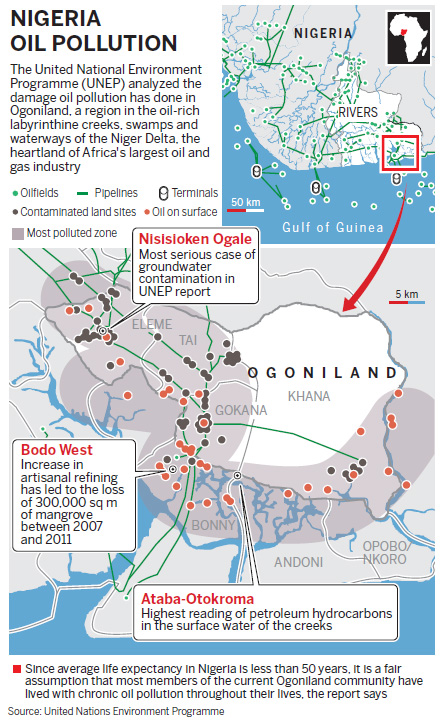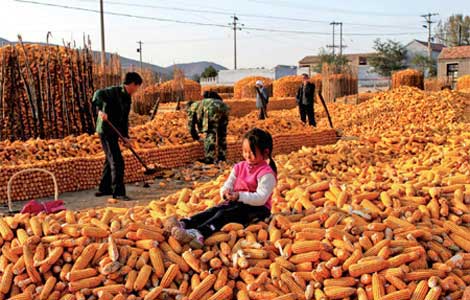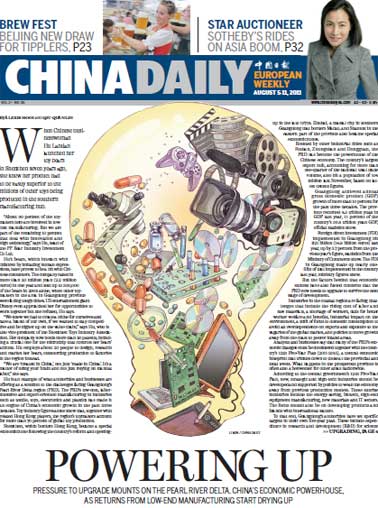Politics
UN slams Nigeria over oil pollution
Updated: 2011-08-06 07:52
By Ola Awoniyi (China Daily)
ABUJA, Nigeria - Decades of oil pollution in Nigeria's Ogoniland region may require the world's biggest ever clean-up, the UN environmental agency said on Thursday as it released a landmark report on the issue.
The United Nations Environment Programme (UNEP) also called for the oil industry and the Nigerian government to contribute $1 billion to a clean-up fund for the region that activists say has been devastated by pollution.
Restoration of the region could take up to 30 years, UNEP said.
Activists reacted to the report by harshly criticizing oil giant Royal Dutch Shell PLC, historically Nigeria's largest producer, which operated in Ogoniland until it was forced to withdraw amid unrest there in 1993.
Shell maintained its stance that oil theft, sabotage and illegal refining were the main causes of pollution.
"The environmental restoration of Ogoniland could prove to be the world's most wide-ranging and long-term oil clean-up exercise ever undertaken if contaminated drinking water, land, creeks and important ecosystems such as mangroves are to be brought back to full, productive health," UNEP said in a statement.
The study of the effects of pollution in Ogoniland, part of the Niger Delta, the country's main oil-producing region, follows a two-year assessment by UNEP.
Its report marks the first major attempt to scientifically document the effects of oil pollution in the region of mainly farmers and fishermen. UNEP called the wide-ranging assessment "unprecedented".
The report points out major health risks in the region of Africa's largest oil producer.
"In at least 10 Ogoni communities where drinking water is contaminated with high levels of hydrocarbons, public health is seriously threatened," the UNEP statement said.
"In one community, at Nisisioken Ogale, in western Ogoniland, families are drinking water from wells that is contaminated with benzene - a known carcinogen - at levels over 900 times above World Health Organization guidelines."
UNEP also said that "control and maintenance of oilfield infrastructure in Ogoniland has been and remains inadequate. The Shell Petroleum Development Company's own procedures have not been applied, creating public health and safety issues".
After being presented with the report, Nigerian President Goodluck Jonathan, the first head of state from the Niger Delta, said the government would consider how to move forward.
"The Nigerian government is going to discuss with Shell and other oil companies that have operated in the area and other relevant agencies of government to see how we can handle this report," he said.
Shell was forced to leave Ogoniland in 1993 following community unrest sparked by poverty and allegations of environmental neglect, however pipelines still cross the area.
"Although we haven't produced oil in Ogoniland since 1993, we clean up all spills from our facilities, whatever the cause, and restore the land to its original state," Shell said in a statement after the report was released.
"The majority of oil spills in Nigeria are caused by sabotage, theft and illegal refining."
Amnesty International took aim at Shell in its reaction, alleging it has failed to deal with years of spills.
"Shell must put its hands up, and face the fact that it has to deal with the damage it has caused," said Audrey Gaughran of Amnesty.
Amnesty has estimated that, if all types of oil pollution in the vast Niger Delta are added up over the past half-century, it would be "on par with the Exxon Valdez every year over the last 50 years".
Ledum Mitee, the head of the Movement for the Survival of the Ogoni People, a regional activist group, called for the government to withdraw Shell's license to operate in reaction to the report.
Ogoniland was the native region of Ken Saro-Wiwa, the renowned environmental activist who was executed by a Nigerian military government in 1995 after what was widely considered a show trial, drawing global condemnation.
Agence France-Presse

(China Daily 08/06/2011 page8)
E-paper

My Chinese Valentine
Local businesses are cashing in on a traditional love story involving a cow herder and a goddess
Outdoor success
Lifting the veil
Allure of mystery
Specials

Sowing the seeds of doubt
The presence in China of multinationals such as Monsanto and Pioneer is sparking controversy

Lifting the veil
Beijing's Palace Museum, also known as the Forbidden City, is steeped in history, dreams and tears, which are perfectly reflected in design.

Beer we go
Early numbers not so robust for Beijing's first international beer festival
